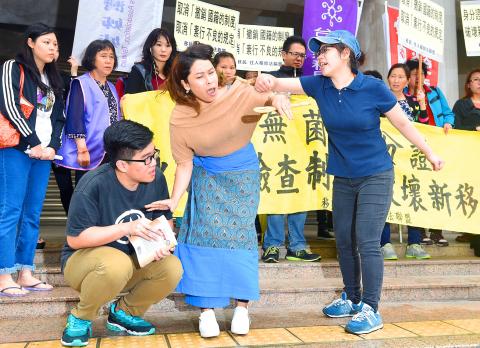The Ministry of the Interior (MOI) on Tuesday said that it is necessary to retain the “good moral character” requirement for new immigrants seeking Republic of China (ROC) citizenship.
Prostitution, drunk driving and other offenses that authorities might consider to be less severe might not appear on a criminal record, but could still affect social order, “and it is therefore necessary to retain such a requirement” in the Nationality Act (國籍法) governing non-citizens who are seeking Republic of China (ROC) citizenship, ministry officials said.
Article 3 of the act requires applicants to “have demonstrated good moral character and to have no criminal record.”

Photo: Liao Chen-huei, Taipei Times
Department of Household Registration Affairs officials were responding to a call by the Alliance for Human Rights Legislation for Immigrants and Migrants to remove Article 3’s “good moral character” requirement from the Nationality Act.
The alliance urged the government to change the “no criminal record” requirement to “no criminal cases record that can be proved by an absence of a police criminal record.”
The public cannot accept the idea that they should be punished for such minor offenses, while foreigners or new immigrants with a record of such offenses can apply for ROC citizenship, the officials said.
They quoted naturalization laws of other countries, such as Canada, South Korea, Singapore and Australia, as requiring applicants for naturalization to “have good moral character” so that once they become citizens they will not adversely impact national security and social norms.
In the US, they said, people who fail to pay for their children’s education or those who are charged with drunk and disorderly behavior or with using illegal drugs are considered as “not demonstrating good moral character.”
They said that in Japan, drunk driving, unintentional crimes and theft are also listed as behaviors “not showing good moral character.”
The ministry has invited academics and experts to discuss how to define what kinds of people have “not demonstrated good moral character.”
During two rounds of discussions, on March 15 and on Monday, participants said that after taking into account new immigrants’ rights and citizens’ perceptions about new immigrants, they would recommend listing only “serious” minor offenses as “not demonstrating good moral character” — such as offenses in which indictment has been confirmed, but delayed, or offenses for which prison terms, fines or delayed execution of the sentence have been handed down.
Also to be considered as “serious” minor offenses are use of hallucinogenic drugs, engaging in gang fights, failure to live up to legal obligations to support a spouse or dependent children, habitual domestic violence and seriously damaging public interest.
Ministry officials said these offenders would be observed for two to three years, after which, if they do not repeat their offenses, they would be permitted to resubmit their applications for naturalization.
“This is a policy that takes into account both the applicant’s rights and the national interest,” they said.

Taiwan is to have nine extended holidays next year, led by a nine-day Lunar New Year break, the Cabinet announced yesterday. The nine-day Lunar New Year holiday next year matches the length of this year’s holiday, which featured six extended holidays. The increase in extended holidays is due to the Act on the Implementation of Commemorative and Festival Holidays (紀念日及節日實施條例), which was passed early last month with support from the opposition Chinese Nationalist Party (KMT) and Taiwan People’s Party. Under the new act, the day before Lunar New Year’s Eve is also a national holiday, and Labor Day would no longer be limited

Taiwan is to extend its visa-waiver program for Philippine passport holders for another year, starting on Aug. 1, Minister of Foreign Affairs Lin Chia-lung (林佳龍) said on Friday. Lin made the announcement during a reception in Taipei marking the 127th anniversary of Philippine independence and the 50th anniversary of the establishment of the Manila Economic and Cultural Office (MECO) in Taiwan, the Ministry of Foreign Affairs said. The decision reflected Taiwan’s commitment to deepening exchanges with the Philippines, the statement cited Lin as saying, adding that it was a key partner under the New Southbound Policy launched in 2016. Lin also expressed hope

Costa Rica sent a group of intelligence officials to Taiwan for a short-term training program, the first time the Central American country has done so since the countries ended official diplomatic relations in 2007, a Costa Rican media outlet reported last week. Five officials from the Costa Rican Directorate of Intelligence and Security last month spent 23 days in Taipei undergoing a series of training sessions focused on national security, La Nacion reported on Friday, quoting unnamed sources. The Costa Rican government has not confirmed the report. The Chinese embassy in Costa Rica protested the news, saying in a statement issued the same

Temperatures in New Taipei City’s Sindian District (新店) climbed past 37°C yesterday, as the Central Weather Administration (CWA) issued heat alerts for 16 municipalities, warning the public of intense heat expected across Taiwan. The hottest location in Taiwan was in Sindian, where the mercury reached 37.5°C at about 2pm, according to CWA data. Taipei’s Shilin District (士林) recorded a temperature of 37.4°C at noon, Taitung County’s Jinfeng Township (金峰) at 12:50 pm logged a temperature of 37.4°C and Miaoli County’s Toufen Township (頭份) reached 36.7°C at 11:40am, the CWA said. The weather agency yesterday issued a yellow level information notice for Taipei, New